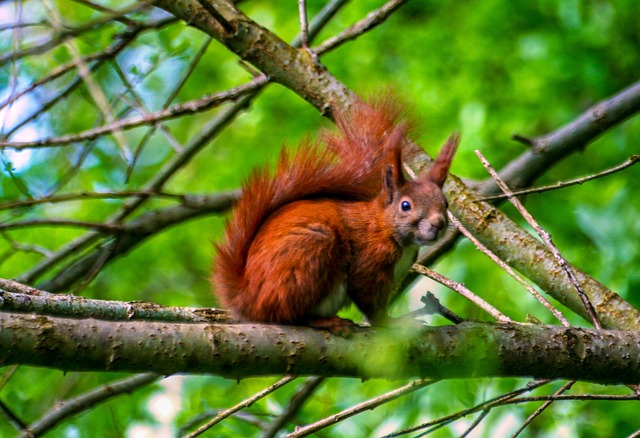Dealing with a squirrel infestation requires a strategic, non-lethal approach focusing on behavior understanding, deterrents (like ultrasonic devices and habitat modification), regular inspection, and maintenance. Effective physical barriers include fences buried 6 inches into the ground and tree guards/mesh cages, while natural or chemical repellents can manage garden damage. Long-term prevention involves structural changes like wire mesh fencing and securing trash cans/compost piles, alongside regular gap inspections and hiding spot removal. These methods provide robust squirrel infestation treatment for sustained protection.
Tired of squirrels wreaking havoc on your carefully cultivated garden? This comprehensive guide offers effective solutions for treating and preventing a squirrel infestation. We explore their appealing habits, from burrowing to nut-gathering, to understand their attraction to gardens. Discover physical barriers, natural chemical repellents, and long-term strategies to deter these furry visitors. Learn how to reclaim your outdoor space with our expert tips on squirrel infestation treatment.
Understanding Squirrel Behavior and Their Garden Appeal
Physical Barriers: Effective Ways to Keep Squirrels Out
Physical barriers are an effective squirrel infestation treatment that can keep these mischievous rodents out of your garden. One of the most common and reliable methods is installing a sturdy fence around the perimeter of your property or garden beds. Opt for a metal or mesh fence with small enough openings to prevent squirrels from squeezing through. Ensure it’s buried at least 6 inches into the ground to stop them from burrowing underneath.
Another physical barrier option is using tree guards or mesh cages around individual trees and shrubs. These barriers physically block squirrels from reaching the plants, protecting them from damage and ensuring your garden remains squirrel-free. Regularly inspect and maintain these barriers to ensure their effectiveness, as squirrels are resourceful creatures that can find ways to bypass them if left unattended.
Chemical Repellents: Deterring Squirrels Naturally
Squirrel infestations in gardens can be a nuisance, but there are natural and chemical repellent options available to help manage and deter these furry visitors. One common approach involves using chemical repellents specifically designed to target squirrels. These products often contain ingredients that emit strong scents or tastes unpleasant to squirrels, encouraging them to stay away from treated areas.
When opting for chemical repellents, it’s essential to choose products approved for garden use and follow application instructions carefully. Many commercially available repellents use components like capsaicin (from chili peppers), garlic, or other natural compounds to create an unpleasant experience for squirrels without harming them. Regular reapplication might be necessary, especially after rainfall, to maintain their effectiveness as a squirrel infestation treatment.
Long-Term Solutions: Preventing Future Squirrel Infestations
To prevent future squirrel infestations, long-term solutions involve making structural changes to your garden and home environment. One effective strategy is to create a physical barrier around your yard or specific plants. This can be achieved by using wire mesh fencing buried a few centimeters underground to deter squirrels from burrowing. Additionally, securing trash cans and compost piles with tight-fitting lids prevents access to food sources.
Regular maintenance is key. Removing any potential hiding spots like dense shrubs or trees, especially near entry points into your home, reduces the appeal of your garden as a habitat. Seasonal clean-ups should include inspecting and sealing any gaps in walls, attics, or crawl spaces that squirrels might use for nesting or entry. Implementing these measures not only helps manage current squirrel activity but also acts as a robust squirrel infestation treatment for sustained protection.
When it comes to dealing with a squirrel infestation, understanding their behavior and employing a multi-faceted approach are key. Combining physical barriers, chemical repellents, and long-term prevention strategies can effectively deter squirrels from your garden. By implementing these treatments, you can reclaim your outdoor space while ensuring the well-being of both your plants and the animals. Remember, the right combination of methods will lead to a successful squirrel infestation treatment and a peaceful, squirrel-free haven.
